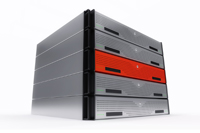 For many small businesses, establishing a reliable IT infrastructure can sometimes be put on the back burner to make time for the more pressing issues involved with developing a successful business operation. But as your business and bottom line increases, it’s time to start thinking about data management solutions.
For many small businesses, establishing a reliable IT infrastructure can sometimes be put on the back burner to make time for the more pressing issues involved with developing a successful business operation. But as your business and bottom line increases, it’s time to start thinking about data management solutions.How does a server differ from a desktop PC?
This is one of the most common questions asked by first-time server buyers. Though the idea behind a server may sound complicated, it’s really quite simple. To begin, servers are not just supercharged PCs. Though they’re measured in many of the same ways (RAM, speed, hard disk space, etc.), servers are designed to process, manage, store and send data – making them ideal for tasks such as database and e-mail management. PCs are designed with user-friendly operating systems and applications in mind to help users perform traditional desktop functions.
Servers are engineered differently than PCs and are built to be more reliable than desktops, allow for data backup and security, and allow data to flow more easily and quickly. Servers are also easily scalable, meaning that as your business grows, you can seamlessly make hardware additions without having to replace and scrap the server you have outgrown.
Do I need a server?
The answer to this question depends on several factors unique to your business. If you have just one or two colleagues performing basic tasks such as sending e-mail, sharing files and browsing the web, you may not need a server at all. But if you have five or more employees joined together on a network, a server will help you to better organize and share files through a central location, manage an e-mail server, or host a company intranet.
Let’s say you’ve started a small advertising agency and have recently added several employees. Whereas you may not have needed a server in the beginning, you’re now finding it harder to share information and collaborate on projects with your coworkers. With the addition of a server, you can set up a central location to share project files, host an image library, develop a CRM database, and protect your information with a firewall or other security system. In this situation, a server does much more than simply store information – it can help a business run more smoothly, effectively and securely.
What kind of server do I need?
As you may have noticed, servers, much like PCs, come in a variety of options in regard to price, performance and form factor (See "Servers 101: Tower vs. Blade vs. Rack – What’s the Difference?"). When buying a server, you need to take into consideration the number of users that will be utilizing the network, and what specific functions will be assigned to the server. Also, it is important to understand your current needs, as well as what your expected needs will be a year or two down the road. If you buy a server based solely on your current needs, you may run out of server space quickly as you acquire and create more information that is stored on the server.
Unfortunately, there is no exact formula to determine which type of server you will need – in most cases, servers are chosen based on their anticipated workload, number of users, and the programs and services they will host.
If you’re ready to purchase a server and need some help finding the one best suited for your needs, our team of IT and server experts will gladly help you find a solution that fits your specifications and budged. Contact our team at sales@servermonkey.com or visit us at www.servermonkey.com.











